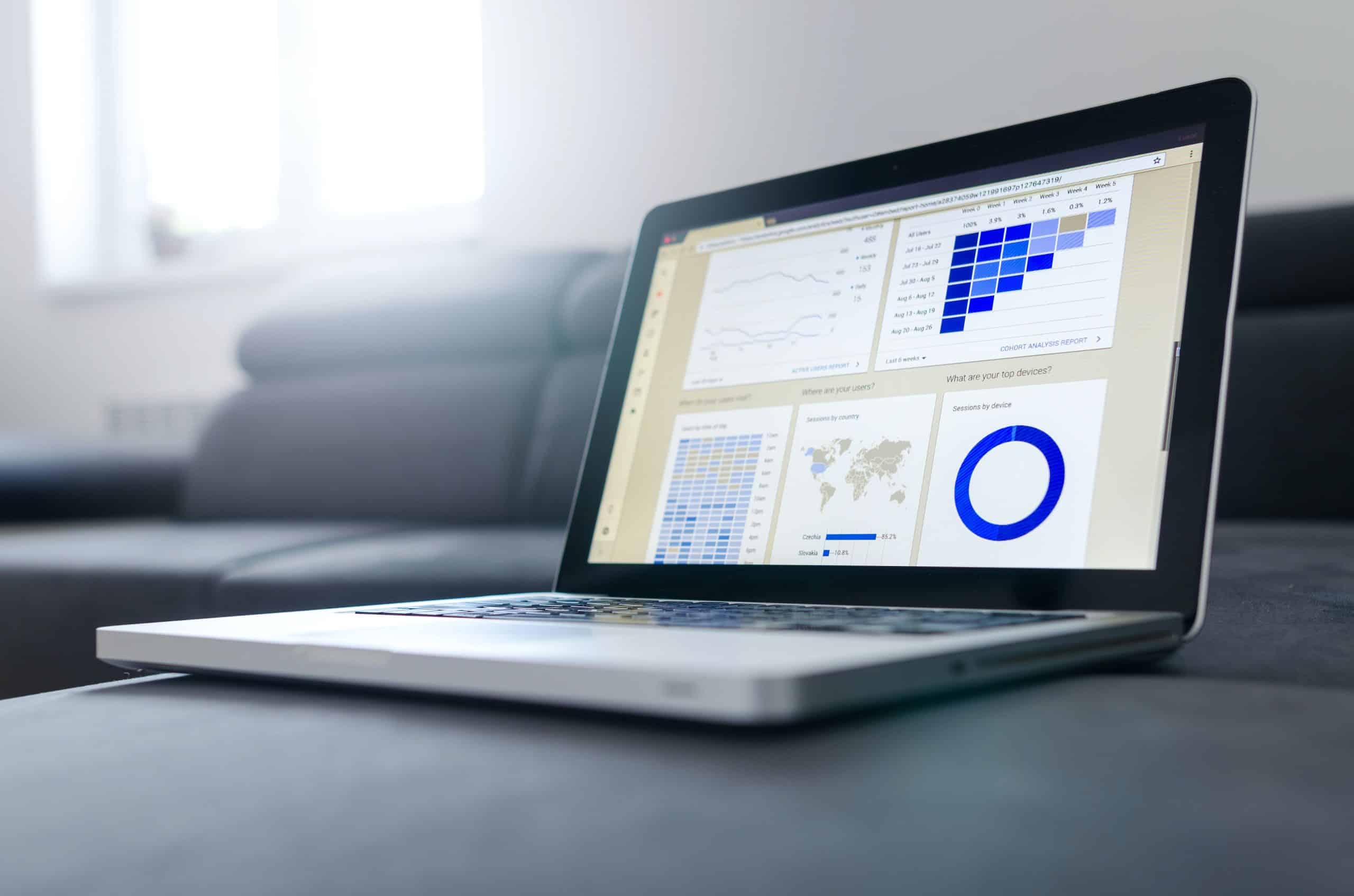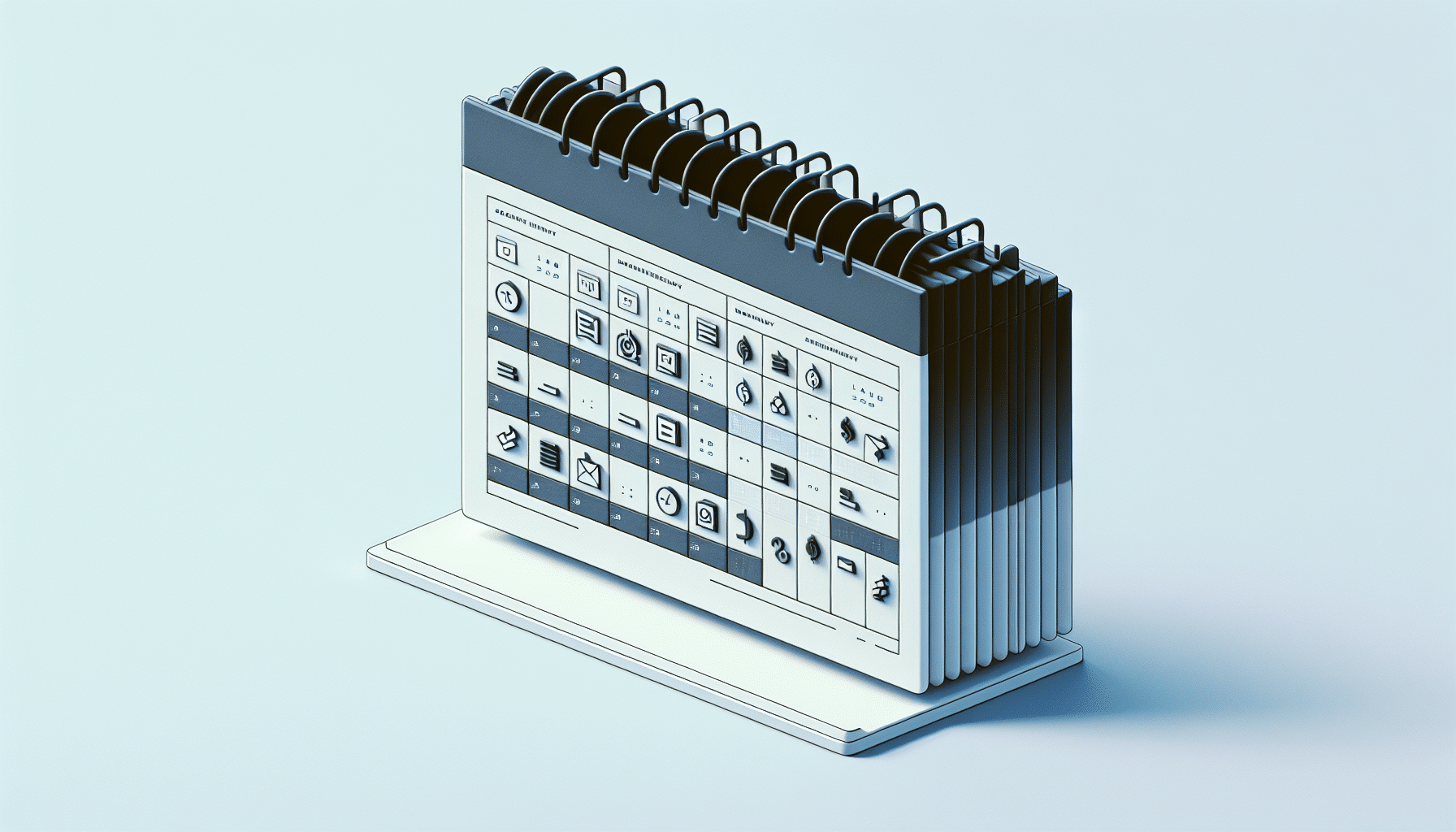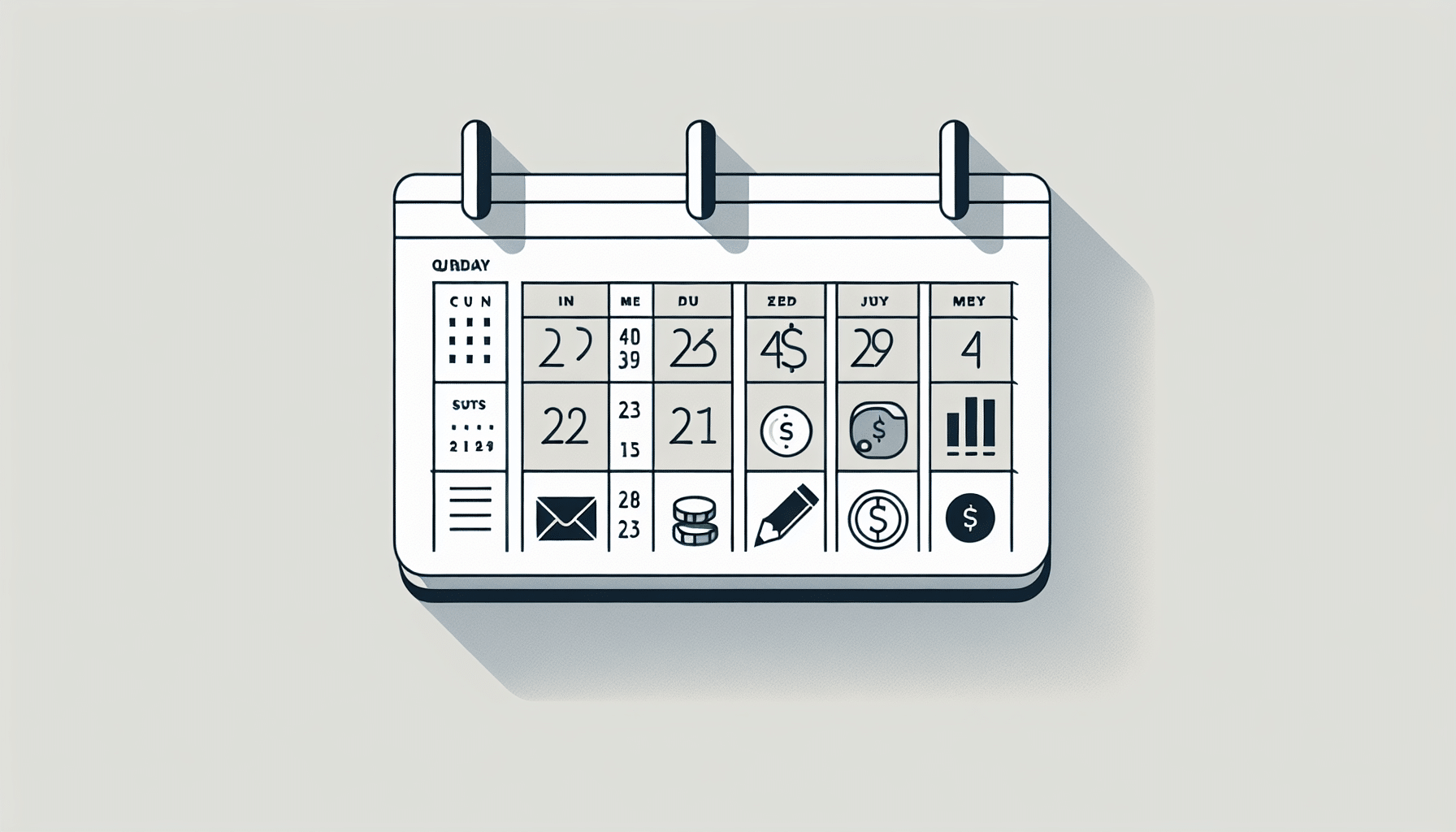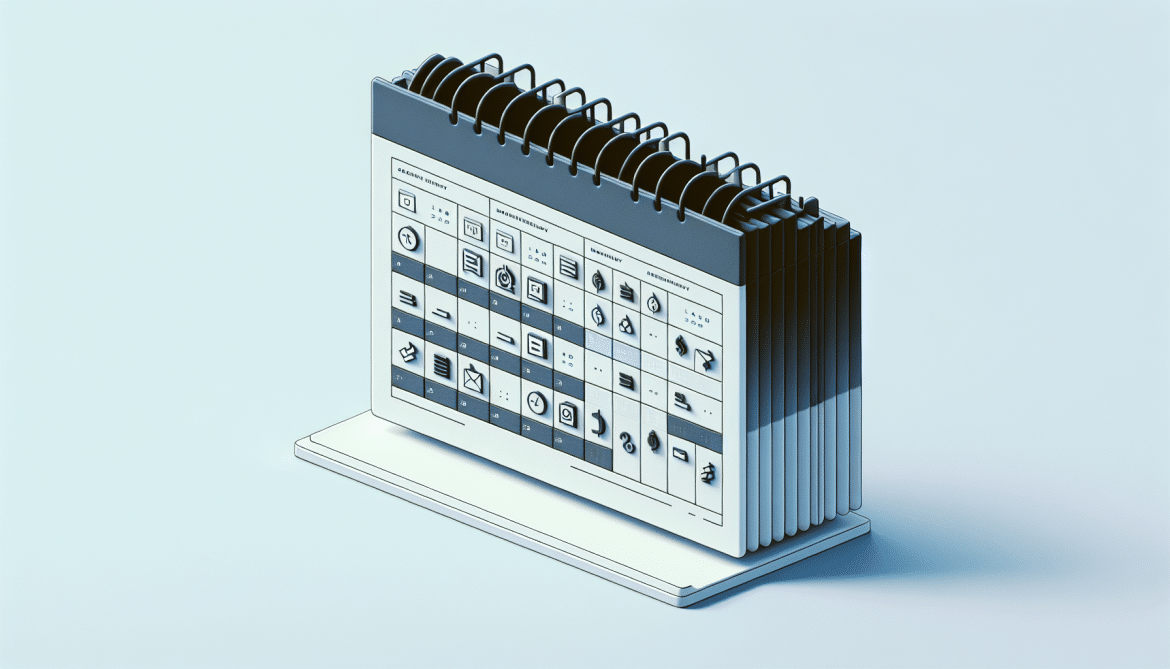If you're looking to take control of your finances and improve your money management skills, then a cash calendar may be the solution for you. A cash calendar is a simple yet effective tool that helps you visualize your income and expenses each month. With a clear layout of your financial obligations, you can avoid missing bills, better manage your money, and even create a plan to tackle debt. Whether you're a busy mom, a small business owner, or a student, a cash calendar can be customized to suit your unique needs. By noting income dates, bill due dates, and savings dates, you can stay organized and on track with your financial goals. Best of all, there are various options available, from paper-based to digital or online cash calendars, making it easy to find one that suits your preference. So, make the commitment today and start planning your financial success with the help of a cash calendar.
What is a Cash Calendar?
A cash calendar is a money management tool that helps visualize income and expenses. It provides a clear layout of income and expenses each month, allowing you to easily see where your money is coming from and where it's going. This simple but effective tool can greatly improve your financial organization and help you make smarter decisions with your money.
Definition of a Cash Calendar
A cash calendar is a visual representation of your monthly income and expenses. It typically consists of a calendar grid where you can input your income sources, bill due dates, and other financial obligations. By using a cash calendar, you can easily see when your bills are due and plan your spending accordingly. It's a straightforward and effective way to manage your money and ensure that you're staying on top of your financial responsibilities.
How it Helps Visualize Income and Expenses
One of the key benefits of using a cash calendar is that it helps you visualize your income and expenses. Instead of sifting through bank statements or trying to remember due dates, you can see all of your financial information laid out in front of you. This makes it easier to plan your budget, track your spending, and make informed decisions about your finances. Whether you're trying to save money, pay off debt, or simply stay on top of your bills, a cash calendar can be an invaluable tool.
Benefits of Using a Cash Calendar
Avoiding Missed Bills
One of the biggest advantages of using a cash calendar is that it helps you avoid missed bills. By noting all of your bill due dates on the calendar, you can ensure that you never forget to pay a bill on time. This can save you from late fees, penalties, and negative marks on your credit report. With a cash calendar, you can easily see which bills are due when, allowing you to plan your payments and stay on top of your financial obligations.
Better Money Management
Another benefit of using a cash calendar is that it improves your money management skills. By visualizing your income and expenses, you can see exactly where your money is going and identify areas where you can cut back or make improvements. This can help you stick to your budget, reduce unnecessary spending, and save more money. With a cash calendar, you have a clear overview of your financial situation, allowing you to make smarter decisions with your money.
Reminders to Save
Saving money can be challenging, especially if you don't have a reminder or plan in place. A cash calendar can serve as your reminder to save. By setting aside specific dates on the calendar for saving, you can prioritize this important financial goal. Whether it's saving for an emergency fund, a vacation, or a down payment on a house, a cash calendar can help you stay on track and make saving a habit.
A Plan to Tackle Debt
If you're dealing with debt, a cash calendar can be a valuable tool in helping you create a plan to tackle it. By visualizing your income and expenses, you can allocate extra money towards paying down debt and track your progress each month. By prioritizing your debt payments and making them a part of your cash calendar, you can make steady progress towards becoming debt-free.

This image is property of images.unsplash.com.
Who Can Use a Cash Calendar?
A cash calendar can be used by anyone who wants to improve their financial organization and stay on top of their money. Here are some specific examples of who can benefit from using a cash calendar:
Busy Moms
Being a mom is a full-time job, and managing finances on top of all the other responsibilities can be overwhelming. A cash calendar can help busy moms stay on top of bill payments, track spending, and prioritize savings.
Single Women
Whether you're just starting out on your own or managing your finances as a single woman, a cash calendar can provide clarity and organization. It can help you manage your income and expenses, track your progress towards your financial goals, and make informed decisions with your money.
Couples
For couples, managing finances together can be a challenge. A cash calendar can help both partners have a clear understanding of their joint income and expenses. It can provide a visual representation of their financial responsibilities and help them work together towards their shared financial goals.
Small Business Owners
Small business owners have unique financial needs and obligations. A cash calendar can help them manage their business income and expenses, track their cash flow, and plan for future expenses. It can also help them stay on top of their personal finances and ensure that their business is not negatively impacting their personal financial stability.
Students
For students who are managing their own finances for the first time, a cash calendar can be a valuable tool. It can help them track their income from part-time jobs or scholarships, plan for their expenses, and avoid overspending. By using a cash calendar, students can develop good financial habits that will serve them well in the future.
Divorced Women
Divorce can bring significant financial changes, and it's important for divorced women to regain financial control and stability. A cash calendar can help them track their income, manage their expenses, and plan for their financial future. It can provide clarity and organization during a challenging time.
Setting Up a Cash Calendar
Setting up a cash calendar is a straightforward process that involves noting income dates, bill due dates, and savings dates. Here's how to do it:
Noting Income Dates
Start by listing all of your sources of income. This can include your salary, freelance work, side gigs, rental income, and any other money that you receive on a regular basis. Note the dates when you expect to receive these income payments on your cash calendar.
Bill Due Dates
Next, gather all of your bills and note their due dates on the calendar. This includes monthly bills such as rent or mortgage payments, utilities, insurance premiums, and any other regular expenses that you have. By noting these due dates, you can ensure that you never miss a payment.
Savings Dates
Finally, set aside specific dates on your cash calendar for savings. Whether it's a weekly or monthly deposit into a savings account, make sure to prioritize your savings and note it on your calendar. This will help you make saving a regular habit and work towards your financial goals.

This image is property of images.unsplash.com.
Types of Cash Calendars
Cash calendars can be paper-based, digital, or online. Each type has its own advantages and disadvantages, so you can choose the one that best suits your needs.
Paper-based
Paper-based cash calendars are simple and easy to use. They can be as basic as a blank calendar where you write down your income and expenses. You can use a traditional wall calendar or a notebook to create your cash calendar. This type of calendar is great for those who prefer the simplicity of pen and paper and don't need any fancy features or technology.
Digital
Digital cash calendars are created using spreadsheet software like Microsoft Excel or Google Sheets. You can create a customized template or use pre-made templates available online. With digital cash calendars, you can easily modify and update your calendar, perform calculations, and create graphs and charts to visualize your financial data.
Online
Online cash calendars are web-based applications or platforms that provide comprehensive money management tools. These calendars often offer additional features such as automatic bill payments, expense tracking, and budgeting tools. They can usually be accessed from any device with an internet connection, making it convenient for users who are always on the go.
Recommended Online Cash Calendars
When it comes to online cash calendars, there are several options to choose from. Here are three recommended online cash calendars:
CalendarBudget.com
CalendarBudget.com is a popular online cash calendar that offers a user-friendly interface and a range of features. It allows you to create and customize your cash calendar, track your income and expenses, set savings goals, and generate financial reports. It also offers mobile apps for convenient access on the go.
Money-Calendar.com
Money-Calendar.com is another online cash calendar that provides a simple and intuitive interface. It allows you to track your income and expenses, set up bill reminders, and create customized reports. It also offers a budgeting feature to help you manage your spending and reach your financial goals.
Moneydance.com
Moneydance.com is a comprehensive personal finance software that includes a cash calendar feature. It allows you to set up your cash calendar, track your income and expenses, manage budgets, and reconcile accounts. It also offers online banking integration for easy transaction tracking.

This image is property of images.unsplash.com.
Commitment and Planning
To successfully manage your finances using a cash calendar, full commitment and regular planning are necessary. Here's what you need to keep in mind:
Full Commitment Required
Using a cash calendar effectively requires a full commitment to updating it regularly and sticking to your financial plan. Make it a habit to review and update your cash calendar on a regular basis, ideally at the beginning of each month. This commitment will help you stay on top of your finances and make better financial decisions.
Regular Planning Necessary for Success
Regular planning is crucial for success with a cash calendar. Take some time each month to review your income and expenses, reassess your financial goals, and make any necessary adjustments to your cash calendar. By staying proactive and planning ahead, you can ensure that you're staying on track and making progress towards your financial goals.
Understanding and Adjusting Income
When setting up your cash calendar, it's important to accurately estimate your monthly income. This will help you plan your expenses and savings accordingly. Here are some tips for understanding and adjusting your income:
Estimating Monthly Income
To estimate your monthly income, start by reviewing your pay stubs, bank statements, and any other sources of income. Calculate your average monthly income by adding up your income over the past few months and dividing it by the number of months. This will give you a realistic estimate of your monthly income, taking into account any fluctuations or irregularities.
Accounting for Irregular or Variable Income
If you have irregular or variable income, it can be challenging to plan your expenses and savings. In this case, it's important to be conservative with your estimates and build a buffer into your cash calendar. Look at your income patterns from previous months or years and identify any seasonal or recurring fluctuations. This will help you adjust your budget and savings goals accordingly.

Prioritizing Expenses
Once you have a clear understanding of your income, it's time to prioritize your expenses. Here's how to do it:
Categorizing Expenses
Start by categorizing your expenses into different categories such as housing, transportation, groceries, utilities, entertainment, and debt payments. This will help you see where your money is going and identify any areas where you can potentially cut back or make adjustments.
Identifying Essential and Non-Essential Expenses
Next, identify your essential expenses, such as rent or mortgage payments, utilities, and groceries. These are the expenses that you need to cover to maintain a basic standard of living. Non-essential expenses, such as dining out or shopping, can be adjusted or eliminated if necessary.
Setting Spending Limits
Based on your income and financial goals, set spending limits for each category of expenses. This will help you stay within your budget and avoid overspending. Be realistic about your spending limits and adjust them as needed to ensure that you're effectively managing your money.
Making Adjustments and Savings
A cash calendar is not set in stone and can be adjusted as your financial situation changes. Here's how to make adjustments and prioritize savings:
Identifying Areas for Improvement
Regularly review your cash calendar and identify any areas where you can make improvements. This could be reducing unnecessary expenses, finding ways to increase your income, or negotiating better deals with service providers. By identifying areas for improvement, you can make the necessary adjustments and optimize your financial situation.
Creating a Savings Plan
Based on your financial goals, create a savings plan that aligns with your cash calendar. Set specific savings targets and allocate a portion of your income towards savings each month. This will help you make consistent progress towards your savings goals and ensure that you're building a strong financial foundation.
Automating Savings
To make saving even easier, consider automating your savings. Set up automatic transfers from your checking account to your savings account on your scheduled savings dates. This way, you're less likely to forget or skip saving, and it becomes a regular and effortless habit. Automating savings can help you reach your financial goals faster and with less effort.
In conclusion, a cash calendar is a valuable tool that can help you visualize your income and expenses, avoid missed bills, manage your money better, and plan for your financial future. Whether you're a busy mom, a small business owner, a student, or anyone in between, a cash calendar can greatly improve your financial organization and empower you to make smarter decisions with your money. By setting up a cash calendar, committing to regular planning, and making adjustments as needed, you can take control of your finances and work towards achieving your financial goals.


